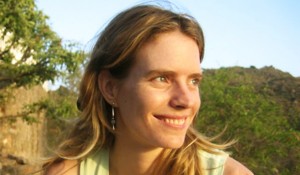The following article, by Lydia Dishman, was published in the October-'2010 issue of Fast Company magazine - the International business publication. We are re-publishing the content from the original article.
 Imagine giving a village full of people who have never seen a film, barely ever watched television, much less have access to a computer, a way to challenge traditional news coverage. To millions of impoverished people in India, Jessica Mayberry offers a way to do just that, by creating their own stories through Video Volunteers.
Imagine giving a village full of people who have never seen a film, barely ever watched television, much less have access to a computer, a way to challenge traditional news coverage. To millions of impoverished people in India, Jessica Mayberry offers a way to do just that, by creating their own stories through Video Volunteers.
 Founded in 2003, well before hyperlocal news became a buzzword as the pillars of traditional media crumbled, Video Volunteers took aim at the widening gap between rich and poor caused by technology in developing nations. By putting cameras in the hands of denizens of India’s poorest villages and slums, Mayberry believes she’s started a global communications revolution.
Founded in 2003, well before hyperlocal news became a buzzword as the pillars of traditional media crumbled, Video Volunteers took aim at the widening gap between rich and poor caused by technology in developing nations. By putting cameras in the hands of denizens of India’s poorest villages and slums, Mayberry believes she’s started a global communications revolution.
"Our goal is to have at least one community producer in each of the 625 districts in India," says Mayberry, likening Video Volunteers to a "grassroots Reuters news agency." But her vision goes beyond just producing a news feed from a place few international journalists claim as their territory. "With training, these videographers can go into the stringer system for any news organization," she says, "they can earn a living."
Video Volunteers has trained 150 community producers so far, most of whom are working full time to produce short “video magazines” that have already been seen by more than 200,000 people. Not bad for a woman who left her own relatively cushy television journalism career behind to volunteer for the America India Foundation’s fellowship program.
"I was disillusioned with the sensationalism in international news," says the CNN veteran. Still, she recognized that, "the last thing India needed was another American making a documentary. It was much more empowering to turn the camera around."
Mayberry’s introduction to participatory video hooked her into the whole world of social change in India. When she completed her nine month tour of duty with the foundation, she stayed on in Ahmedabad, talking to mentors about how to start her own enterprise. Like so many nascent entrepreneurs, Mayberry worked out of her bedroom with her soon-to-be husband, a filmmaker and activist.
"We came up with the model and pitched it to 10 major NGOs. Six funded us at about $30,000 each, enough to get the program started," she explains. Going back to the States, Mayberry solicited more support and set up the organization as a 501c3 nonprofit.
Video Volunteers currently has a staff of 12 and an annual budget of $350,000 with plans to expand its footprint -- they’ve already launched the program in Brazil, and are looking to Kenya and Indonesia next. "Both have a strong middle class, but both have serious need."
Though the native New Yorker doesn’t have a ready answer as to why she chose India at the start, Mayberry does recognize that she’s onto something big. Just as the blogosphere has leveled the playing field in developed nations, Mayberry sees community video democratizing the media in places that are decades away from internet connectivity and 100 percent literacy.
It’s also breaking down taboos. A young community producer from the so-called "untouchable" caste was permitted to enter his village temple for the first time in his life simply because he held a camera in his hand. Talk about progress and innovation. Here's what Jessica Mayberry told Fast Company about her journey.
On social entrepreneurship in 2010: "There is a lot more interest and acceptability on the part of parents and teachers. Nonprofits are now more likely to capture people’s imagination because of the ease of communications. From a cost perspective it is easier to set up site and start fundraising. With Facebook’s 'Causes' they get their plane ticket covered and they're off to do the work. But also, in the NGO sector, it was gender inequality in the 90s and microcredit over the last 10 years. Communications are the next big idea."
On unexpected challenges: "Every target we think we can meet we have to cut in half. That is the reality. We are not in New York. Here it can take six days for the couriers to get the videos. Sometimes the videographer will spend 5 hours on the bus just to get to the post office."
On making an impact: "During the Depression, photographers like Walker Evans documented people who were ignored. I don’t see us the same way. I view us as trainers and capacity builders empowering other people to tell their own stories. It is a huge role for people to give context, especially when their newspapers don’t provide relevant information that serves the needs of the poor. They want news of jobs, education, corruption, and bribery, and what they get are papers filled with celebrities and gossip."
On finding the right filmmakers: "To select community producers, the NGO’s field workers publicize the job opening by spreading the word in the villages and slums where they work, and then organize selection workshops. Sometimes more than 100 people come forward to fill eight spots. Producers don’t need literacy or education, they need a spark. We’re looking for a commitment to effect change as well as creativity and confidence. At the selection workshops, they are asked to sing songs, put on a short drama or give a speech about something they are passionate about. While building the group of producers, we are careful to ensure that women make up at least half of the team and that we have representation from the most marginalized groups in the area."
On how it works: A CVU is a local production unit run by eight community members who are trained in all aspects of video production. They work full-time and receive a salary.
- Each CVU has digital video cameras, computers for editing, a TV, and a widescreen projector and sound system for outdoor screenings.
- Producers are trained full-time, on-site for 12-18 months by a professional filmmaker.
- The CVU produces one video magazine every eight weeks on different social issues.
- Topics are chosen by an editorial board of community members, the CVU team and the NGO.
- One video magazine is screened every eight weeks month in 25 villages or Bastis (slums).
- With an average of 200 people at each screening, the film reaches around 5,000 people.
- Villagers see approximately six films a year. The recurring screenings foster participation and ownership by the community.
Fighting for Change: The Story of Bihar-Based Journalist Amir Abbas
Inspiration can come from many sources, but one of the most powerful is seeing someone walk the path before you. Our Community Correspondent, Syed Amir Abbas found his inspiration in Stalin K., the founding director of Video Volunteers. “I met Stalin at VV’s national meet in 2017 and I...
Video Volunteers Receives Encouraging Response To Its Buland Bol Program
Free media training course Buland Bol aims to train hundreds of people in becoming the voice of their communities.
